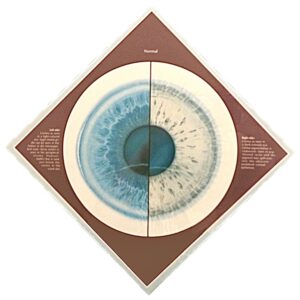

We Support Your Eye Health
Follow your primary care and eye doctor's provisions for maintaining your vision.
The eye is a complex organ filled with many different parts. It gives people the ability to see in color, in three dimensions, and in low light.
Eye Health Begins With You - Tips to protect your vision
 Ask about your family’s eye health history.
Ask about your family’s eye health history.
Ask your family members about their eye health history. Knowing who has been diagnosed with a disease or condition because many are hereditary is helpful information for your eye care physician. This aids in evaluating the risk for developing an eye disease or condition.
 Eat healthier to protect your sight.
Eat healthier to protect your sight.
You’ve probably heard you are what you eat. Eating a diet rich in fruits and vegetables, especially dark leafy greens such as spinach, kale, or collard greens is important for keeping your eyes healthy too. Researchers report there are increased eye health benefits when eating fish high in omega-3 fatty acids, such as salmon, tuna, and halibut.
 Talk to your primary care physician about a healthy weight.
Talk to your primary care physician about a healthy weight.
Find out what you can do to remain at a good body mass index BMI from your primary doctor. Being overweight or obese increases your risk of developing diabetes and systemic conditions, which often leads to vision loss, such as diabetic eye disease or glaucoma. Sleep, diet and exercise are 3 main components to pay attention to.
 Wear protective eyewear.
Wear protective eyewear.
Are you protecting your eyes when participating in sports or high risk to eye activities? Protective eyewear includes safety glasses and goggles, safety shields, and eye guards specially designed to provide the correct protection. Most protective eyewear lenses are made of polycarbonate, which is 10 times stronger than other plastic. Buy protective eyewear to prevent eye damage that often occurs but is preventable.
 Know and institute workplace eye safety.
Know and institute workplace eye safety.
Know your employers safety policies and encourage company safety policies if they are not followed. Employers are required to provide a safe work environment. Use protective eyewear that is required as a part of your job activities. Make sure they are kept up to date and are replaced when worn. Making a habit of wearing the right eye protection and encouraging your coworkers to do the same can prevent serious eye injuries.
 Give up smoking.
Give up smoking.
Smoking is as bad for your eyes as it is for the lungs and entire body. Research has linked smoking to an increased risk of developing age-related macular degeneration, cataract, and optic nerve damage. All of these conditions can lead to blindness. Not only should you not start a smoking habit, but you should quit if you have.
 Keep your shades close.
Keep your shades close.
Sunglasses are more than a great fashion statement. Your eyes deserve protection from the sun’s ultraviolet rays. Buy sunglasses that block out 99 to 100 percent of both UV-A and UV-B radiation and keep them in your car, purse, or hanging where you see them to use often.
 Reduce eyestrain.
Reduce eyestrain.
Eyestrain can tire out your eye muscles. If you spend lengthy amounts of time in front of a computer or focusing on one thing, you should blink your eyes more to prevent fatigue. Get used to adhering to the 20-20-20 rule - every 20 minutes, look about 20 feet in front of you for 20 seconds. This can help reduce eyestrain.
 Clean your hands and use your contact lenses properly.
Clean your hands and use your contact lenses properly.
If you use contact lenses, practice applying them correctly. The risk of infection is reduced if you always wash your hands thoroughly before putting in or taking out your contact lenses. Daily wear lenses also help reduce bacteria and infection. Make sure you are trained and follow contact lens use instructions from your eye care doctor.
 Have a comprehensive dilated eye exam.
Have a comprehensive dilated eye exam.
Rule out common vision problems. You might think your vision is fine and your eyes are healthy, but visiting your eye care professional for a comprehensive dilated eye exam is the best way to be certain. Sometimes you don’t know your vision could be better with glasses or contact lenses. Many common eye diseases such as glaucoma, diabetic eye disease and age-related macular degeneration often have no warning signs. A dilated eye exam is the only way to detect these diseases in their early stages.
In a dilated eye exam, your eye care professional places drops in your eyes to dilate, or widen, the pupil to allow more light to enter the eye. This enables us to get a good look at the back of the eyes and examine them for any signs of damage or disease. This is the only way to evaluate how healthy your eyes are and how well you're seeing .
YOUR VISION AND GENERAL HEALTH MATTER
Maintaining your overall health is part of the experience and passion behind our services.

